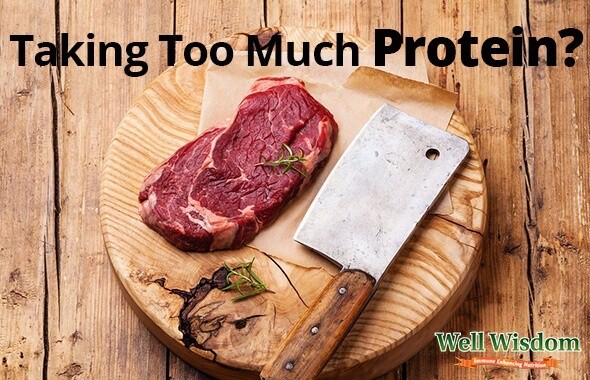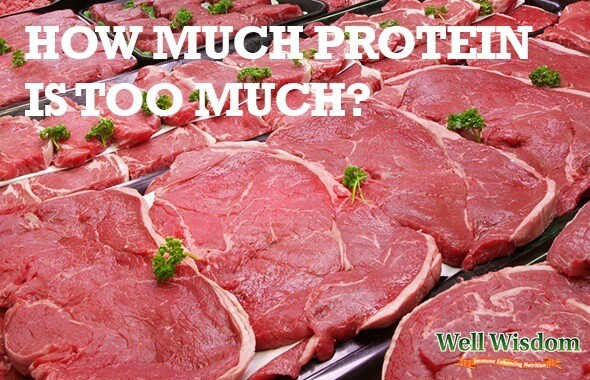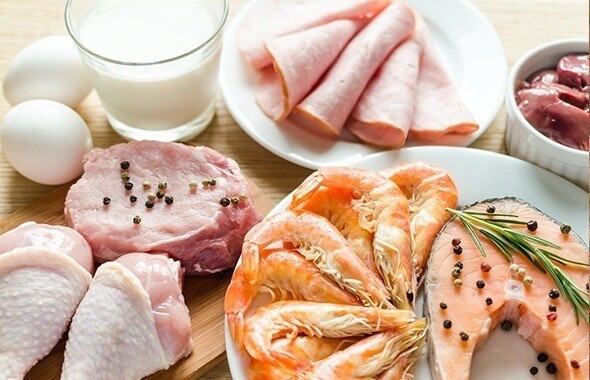Protein is one of those foods you can’t help but love! It has that deliciously rich flavor of fats mixed with amino acids, so no matter what you add it into, it just makes food wonderful.
 It’s also a nutrient needed to gain muscle, lose weight, and burn fat. It has become the most important part of a number of diets, such as the Low-Carb, High-Fat diet, the Paleo Diet, and the Atkins Diet.
People emphasize protein in their diet, trying to get as much as possible in order to maximize their muscle gains and fat loss. Bodybuilders will often supplement their diets with A LOT of protein powder, as well as eating meals that are primarily protein.
But could this be the wrong approach? Could you be eating too much protein? Is there such a thing?
All of these questions will be answered in the post below…
It’s also a nutrient needed to gain muscle, lose weight, and burn fat. It has become the most important part of a number of diets, such as the Low-Carb, High-Fat diet, the Paleo Diet, and the Atkins Diet.
People emphasize protein in their diet, trying to get as much as possible in order to maximize their muscle gains and fat loss. Bodybuilders will often supplement their diets with A LOT of protein powder, as well as eating meals that are primarily protein.
But could this be the wrong approach? Could you be eating too much protein? Is there such a thing?
All of these questions will be answered in the post below…
Why Protein is Important
Protein plays a huge role in the health of your body. It contains the amino acids that are needed to build muscle, promote healthy circulation, improve heart health, and so much more. Protein rebuilds and repair body tissue that has been damaged via exercise (a good thing). Understanding tissue damageWhen you lift weights, you push the tissues of your muscle beyond what they are capable of handling. This is why your muscles grow fatigued after a set number of reps and exercises. The fatigue is manifested not only by tired muscles, but there are tiny tears in the muscle tissue.
These tears can lead to swelling, which is what causes sores muscles the next day. Protein is needed to repair the tiny tears in the muscle, and it helps to expand muscle fiber size and count–ensuring that you can store more energy (strength).
Basically, without protein, your muscles just wouldn’t work. Protein is the only source of ATP energy, the type of energy that is burned by your muscles. Getting enough protein is the key to fueling your muscles!How Can You Avoid Taking Too Much Protein?
 If you’re not sure of how much protein to take, the truth is that you risk going overboard with your protein consumption. Many people add protein to EVERY meal, adding more protein than both carbs and fats combined.
They end up suffering from health problems and often even gaining weight, simply because they added TOO MUCH protein to their diet.
But how much is too much? Is over compensation of protein even possible?
If you’re not sure of how much protein to take, the truth is that you risk going overboard with your protein consumption. Many people add protein to EVERY meal, adding more protein than both carbs and fats combined.
They end up suffering from health problems and often even gaining weight, simply because they added TOO MUCH protein to their diet.
But how much is too much? Is over compensation of protein even possible?
How Much Protein to Take
According to the US Government Health Department, it’s recommended to consume:- 46 grams of protein per day (for the average 128-pound woman leading a sedentary lifestyle)
- 56 grams of protein per day (for the average 156-pound man leading a sedentary lifestyle)
How did we come by that number? Simple!
To figure out how much protein the “average” person needs, simply use the following equations: Metric: Take your bodyweight in kilograms, and multiply it by 0.8–the number of grams of protein you need per day. (Example: a 75-kilo man would need 60 grams of protein. 75 x 0.8 = 60) Imperial: Take your bodyweight in pounds, and multiply it by 0.36–the number of grams of protein you need per day. (Example: a 200-pound man would need 72 grams of protein. 200 x 0.36 = 72) Of course, that is for the AVERAGE person, leading a sedentary lifestyle. For those who lead more active lives, it’s recommended that you consume about 30% of your daily caloric intake in protein.
Let’s say you eat 2100 calories per day. That means you would need to consume 700 calories’ worth of protein. Considering that there are 4 calories in each gram of protein, that would equal 175 grams of protein per day. That’s a lot, but are you consuming more protein than your body needs? The answer is: probably not. If you are lifting weights and doing strength training every day, you will find that your body burns through the amino acids very quickly. You can consume up to 1.7 grams of protein per kilogram of bodyweight per day, and you’ll be find if you are a power athlete. Endurance athletes (marathon runners, swimmers) should consume a bit less–around 1.3 grams per kilogram of bodyweight per day.Benefits of High Protein Intake
Aside from that fact that eating a lot of protein can help to build muscle, the truth is that protein is effective for weight loss. Eating more protein will give your metabolism a boost–just consuming 25 to 30% of your daily calories in protein can help you to burn up to 100 more calories per day. Eating more protein will also help to reduce your risk of cravings. Carbs and sugary foods cause cravings, but protein and fats are far less addictive. Protein is also far more satiating than carbs, so you will feel fuller for longer after eating a protein-heavy meal. As you can see, eating more protein is excellent for your health, but be careful not to eat too much!The Dangers of Protein Over Consumption
 If you go all out with the protein–eating MAINLY protein every day–you could end up harming your body.
Here are a few of the dangers of eating too much protein:
If you go all out with the protein–eating MAINLY protein every day–you could end up harming your body.
Here are a few of the dangers of eating too much protein:
Gout
When you eat a lot of protein, the fat and protein is converted into nitrogen. That nitrogen can put a strain on your kidney, which causes it to release more uric acid. That uric acid can collect around the joints of the toes (particularly the big toe), leading to the formation of those painful uric acid crystals that cause gout.Weight Gain
If you eat too much protein-rich food, you’re likely consuming a lot of fat as well. Fat contains 9 calories per gram, so eating high-protein, high-fat foods can lead to higher calorie consumption. Weight loss is all about cutting back on the calories you eat per day, but consuming more calories than your body can burn is what leads to weight gain. If you’re seeing the OPPOSITE of the weight loss results you want, it may be the result of eating excessive protein.Insufficient Fiber
Protein rich foods rarely contain fiber. You’ll find that most of the foods high in fiber–red meat, chicken, eggs, fish, and dairy products–are very low in fiber, and even the higher-fiber foods–nuts, beans, seeds, protein-rich veggies–still don’t contain enough fiber to offset the amount of protein and fat you are consuming. Eating a lot of protein without enough fiber can lead to digestive problems like constipation or diverticulitis.Kidney Strain
Protein is converted into nitrogen by the body in order to be used for energy, but any excess protein that your body can’t use is then excreted by your body via your urine. Too much nitrogen in your waste can strain your kidneys, leading to reduced function and even kidney damage. People with kidney disease are recommended to avoid diets with excessive protein for this very reason! So, as you can see, while it is difficult to consume excessive protein, it is possible, and the side effects of protein over-consumption are very real! Be smart with the way you eat protein, and avoid doing damage to your body.- Best Fitness Supplements: Glutamine and Colostrum Uses and Benefits - December 19, 2019
- Cooking with Protein Powder - November 22, 2019
- Is There A Point To Taking Whey Protein After Cardio? - September 16, 2019





